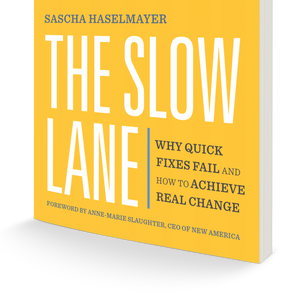About a year ago, Diana Wells, my wonderful colleague at Ashoka, pointed me to Gal Beckerman's book, The Quiet Before: On the Unexpected Origin of Radical Ideas. She recalled reading the review after a long conversation we had about the Slow Lane. The Quiet Before is a beautiful book that, through carefully reconstructed stories, shows that radical ideas that brought about real change, didn't come about in big bangs. Instead, they emerged out of quiet deliberation, a kind of whisper, and took unexpected twists and turns. And change, especially of the slow kind, is something we should learn more about.
“Radical change... doesn’t start with yelling. It starts with deliberation, a tempo that increases, a volume set first at a whisper. How else can you begin to picture what doesn’t yet exist?”
Gal Beckerman is a writer and senior editor for books at The Atlantic. His book, The Quiet Before, traces back the origins of ideas that changed the world—ideas like modern astronomy (1635, France), universal suffrage (1839, Manchester), feminism (1913, Florence), free speech in African colonies (1935, Ghana), resistance to the Soviet repression (1968, Russia), young women taking control (1992, United States), and the Arab Spring (Cairo, 2011)—to surprising places, communities, and forms of communications.
The Surprising Power of Slow Communications
The Quiet Before really is a book about how the way we share ideas influences their trajectory. It is a celebration of slow communications as the essential ingredient for real change. A slowness that Gal Beckerman brings to life by letting us dive into the worlds and human relationships out of which radical ideas emerged.
One such world is that of Nicolas-Claude Fabri de Peiresc. He used the medium of post to become a connector of Europe's greatest minds in the 1600s. He corresponded with people across continents in what became a Republic of Letters, a slow process of thinking at a time when suggesting the earth wasn't the center of the universe could get you burned at the stake. Driven by curiosity, he kept pushing the limits of post as a medium to the point where, in a painstaking effort, he even set up an ambitious experiment involving amateur astronomers in France, Egypt, and the Lebanon to draw a better map of the Mediterranean Sea. His correspondence reveals the gentleness, patience and immense effort it took for Peiresc to build trust, and gradually win people over to his cause, and ultimately a new science-based worldview. His slowness, proved a highly effective way of confronting the rigid system of truth established by the church.
Reading The Quiet Before, lets us build an eclectic collection of effective, and surprising, means of slow communications: the postal system of the 1600s, utopian manifestos in Italy in the 1910s, samizdat (underground self-publishing) in the Soviet Union, homemade counter-culture zines published by girls in the United States in the 1980s, and email groups used by public health scientists during the Covid-19 pandemic. What they have in common is that they spread bold ideas at just the right speed, allowing others to contribute and engage in meaningful ways.
The Quick Fix That Failed The Revolution.
Gal Beckerman contrasts ideas emerging out of a slow and quiet deliberation, by taking us to the Fast Lane world of Facebook pages that sparked the protests in Tahrir Square, and eventually toppled the Mubarak regime in Egypt in 2011. One of the protagonists here is Wael Ghonim, a young Google employee in Dubai, who administered a Facebook page that became one of the lightning rods for the activists in Egypt. He applied his Fast Lane skill set, what he learned about online sales and marketing, to generate traction for his page: posting ever more dramatic content in the form of violent footage of police brutality. Then, he ramped up user engagement: likes, comments, and finally activism in the streets. Within a week, users began to take part in silent protests across the country. Within a few months, the Mubarak regime had stepped down.
“What they didn't need was a medium of incessant one-upmanship, which only helped turn the air acrid”
Like many quick fixes, the Tahrir Square revolution, although successful in toppling the regime, soon turned out to have been in vain: just two years later, the army retook full control of the country. Wael Ghonim shares how, to his mind, Facebook simply was the wrong medium to organize the opposition, once the regime was toppled. Activist groups couldn't find common ground, in part because Facebook encouraged “incessant one-upmanship”. Or, in the language of the Slow Lane: when the critical moment arrived to negotiate the transition to democracy, instead of building bridges and developing ideas at the speed of trust, Facebook accelerated the unhealthy parts of human relationships. It amplified small differences in the movement into ever more radical positions. Tied up in internal conflict, the opposition was unable to keep up with the speed of events it had unleashed, in part because it lacked the patience, the means, and the practice of social imagination.
Set A Slow Table To Let Ideas Bounce Around.
Gal Beckerman builds a compelling case: Where slow communications prevailed, meaning where people deliberated at the speed of trust in safe spaces, they didn't just produce better ideas, but also more sustainable change. He uses the table, a metaphor introduced by Hannah Ahrend in her book The Human Condition in 1958, to show what has gone lost in the age of social media. Without the table, we have nothing to gather around, nothing to hold us together for the course of a meal or a meeting, no boundaries to create a safe space. Remove it from a group of people gathered for a meal, and it is left helpless. What the slow forms of communication have in common is that they provide such a table: their physical form may be a correspondence by letters or a homemade newspaper, but they also embody a set of human values and an invitation. The table is a useful metaphor for what we need to provide the space for human deliberation.
“And so it went. A manifesto about sculpture pointed back to an earlier one about music, and still another, about the state of architecture, alluded to the previous two.”
Ideas in The Quiet Before are never linear. They bounce around. Like in the case of the degrading, terrifying and war-inciting ideas that the Futurists promoted through their manifestos in the early 1910s. But the energy of the Futurists and their brutal manifestos fascinated Mina Loy - a young artist, poet, and bohemian - and inspired her to write (but never publish) her “Feminist Manifesto” in 1914. It wasn't the ideas of the Futurists she found compelling, but she felt compelled to engage with their bold formats of claiming futures. In some ways, this, too, resonates with what I have learned in the Slow Lane. Movements like the German environmental movement may or may not be successful in sparking a true ecological transformation. But along the way, they sparked or accelerated radical ideas that revolutionized the political system and energized other social causes like women's rights (Germany's current Green Party foreign minister Annalena Baerbock promotes a feminist foreign policy). Radical ideas, like movements for change, can yield surprising results.
How We Socialize Ideas Matters.
My main takeaway from The Quiet Before is this: What matters as we think about contributing to real change—whether as activists, leaders in government, entrepreneurs or simply citizens and parents—is more than just the quality of our ideas or the level of energy we can muster. The tools, the how, of how we shape our ideas, how we channel and socialize them, will have repercussions that go beyond our wildest dreams. How we set the table matters, even if we can't foresee how.
How we shape our ideas, how we channel and socialize them, will have repercussions that go beyond our wildest dreams.
The Quiet Before is a testament to the five Slow Lane Principles. In her work as a representative in the Georgia House of Representatives, Stacy Abrams put the first three principles—Hold the Urgency, Listen, Share the Agency—into action. As minority leader in 2011, she set out to register more people of color to vote, so that their concerns and demands might find fuller voice. She did this through intimate and frequent conversations, in the form of “dozens of listening tours that registered new voters, moving them past their sense of powerlessness and letting them talk about their needs. Without much attention and with a projected timeframe of a decade, Abrams' team did their slow steady work, which culminated in turning Georgia, a solidly red state for more than two decades, into a blue one in 2020—with the addition of a million voters.” And these quiet, slow and deliberative conversations are the ideal places to nurture the curiosity of people and movements, pulling in inspiration from science, arts, and culture.
Slow Lane Technology 2.0: A Mindset Shift
Gal Beckerman asks meaningful questions about how technology can be an enabler for these slow, very human deliberations. John Coate (a.k.a. Tex), one of the world's first managers of an online community in the mid-1980s Bay Area, the WELL, reflects on the immense effort and impossibly exhausting toll it took to maintain a well-set table online. Unable to find a sustainable business model for this tiring form of human community management, startups looked for ways to build more scalable social networks. Eventually, they cast aside the need for caring community managers like Tex, and replaced them with technological short-cuts and quick fixes, to let automation do the work of keeping people engaged. The result is platforms like Facebook, a design of uncompromising attention-seeking, that ended up both starting and sinking the Tahrir Square revolution by amplifying emotions.
Searching for alternatives, the book explores alternatives to Facebook, like Discord and Mastodon servers that appear to offer the slow, and quiet spaces for deliberations to take off. But a closer look reveals that their lack of transparency and inclusiveness means that they tend to become hotbeds for extremists or exchanges for unsavory content. vTaiwan, a social media tool that emerged out of the 2014 Sunflower Movement and lets people to participate in policymaking and legislation. Well conceived as it is, it tailors more to the needs of a survey than the free flowing, slow conversations that create communities and spark radical ideas.
And so, in true Slow Lane fashion, Gal Beckerman concludes his search for a quiet technology by pinning his hope less on finding a perfect digital platform, and instead on changing our mindset: Let's forget the idea that technology is neutral. And instead, embrace the idea that we have to be mindful of the impact technologies have on our ideas. Then, we can be discerning to find (or build!) the right tools for each step along our journey to change. That, of course, may seem slow and tedious at first. And yet, it's precisely how German high-school students built a technology that makes classrooms more inclusive for millions. It ensures that technologies, and any other means of communications, work at the speed of trust to enable our relationships and our desire for change. And let our social imagination unfold.
And ultimately, arrive in the right place, faster.



